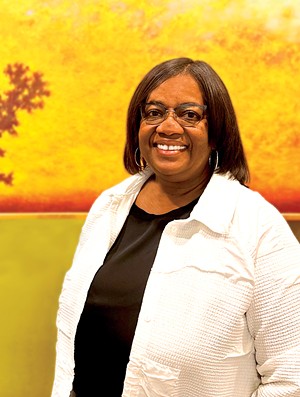
Two numbers that concern Melissa Hostetter are 76% and zero.
The first is the percentage of fourth-graders in Springfield School District 186 who aren't proficient in reading. The second is the number of librarians in the district's elementary schools.
Hostetter, who chairs the Springfield Education Association's literacy task force, believes there is a strong correlation between those two numbers.
"A lot of our students live in a total library desert," she said. "They don't have access to a library at their school. And they don't have access to a library in their community. If we want our children to be literate, part of that is having access to books."
Last month, Hostetter spoke before the Springfield City Council about the need to expand library service into the community's neighborhoods. Whether her organization, which is the union for Springfield teachers, will address the dearth of school librarians in upcoming labor negotiations remains an open question.
But she said there is a connection between student underperformance in reading and an absence of librarians in most of the city's schools.
Both the school district and the city have been whittling away library resources for decades. Between 2005 and 2010, the city of Springfield closed all three of its branch libraries.
And 12 years ago, in a round of budget cuts, District 186 eliminated librarian positions in all of its elementary schools. For some schools, such as Harvard Park Elementary School, this meant the school would no longer have a library.
Other elementary schools, disproportionately in the city's more affluent neighborhoods, have maintained their libraries through fundraisers and having parent volunteers staff them.
Susan Pennington, a librarian at one of the city's middle schools, Lincoln Magnet, said she sees the impact of these budget decisions. Sixth graders entering her building for the first time are amazed.
"When those kids come through and they see an actual library, when they've come from a school that has none, they are very excited – especially if they love books. 'What? You have a library? And you get to come and check out books?'"
The role of a school librarian is to guide students to appropriate literature and help instill a love of reading in youngsters, Pennington said. Unfortunately, most of the incoming students at her school have not had such an opportunity to be mentored.
"Parent volunteers who come in and help check out the books haven't read the book reviews about the book. They haven't read the books. So, they just let the kids have a 'free for all' in picking what they want," Pennington said. "Having an elementary librarian teach these kids how to use books and how to find the books that best suit them is very important."
Springfield schools are hardly alone in trimming librarian positions, said Tania Otero Martinez, a policy analyst with American Progress, a liberal Washington-based think tank.
She told Illinois Times that since 2000, there has been a 20% drop in school librarian positions, which equates to 10,000 fewer full-time school librarians in U.S. schools.
Martinez noted that Black and Latino students who have access to larger school library collections saw their advanced writing scores more than double compared with their peers in schools with smaller collections.
In Springfield, 97% of fourth-graders in the high-poverty, majority Black schools are not proficient in reading and writing, according to the Illinois State Board of Education.
Educators say children's lack of access to books is a factor in why so many are not learning to read well.
Gwen Harrison, the city of Springfield's library director, took the helm in 2023, long after the city's library branches closed. She noted the desirability of branches reopening but added it is unlikely.
"I did some rough math on what it would take to (open branches). It's expensive, with staffing and a building and equipment and books," Harrison said. "I don't think it's going to happen. It is way bigger than me."
But that doesn't mean the city is giving up on neighborhood library outreaches.
She noted that the city is spending more than $500,000 to have a bookmobile created. The money for this endeavor is being paid entirely from a $1 million bequest left to the library.
The bookmobile will begin visiting neighborhoods sometime next year, Harrison said.
"The focus will definitely have to be those folks that are home. So, there will be an emphasis on preschoolers: tots, babies and of course, everybody else afterwards," she said. "The aim of my team to make sure that the bookmobile visits all of the wards. They (will) get out all over the city. They're working with nursing homes, and they're going to the parks and other community organizations."
Harrison concedes it will not have as great an impact as a permanent building.
"We know that it doesn't even compare to having a branch in your neighborhood," she said. "But it is certainly a good start."
Scott Reeder, a staff writer with Illinois Times, can be reached at [email protected].

